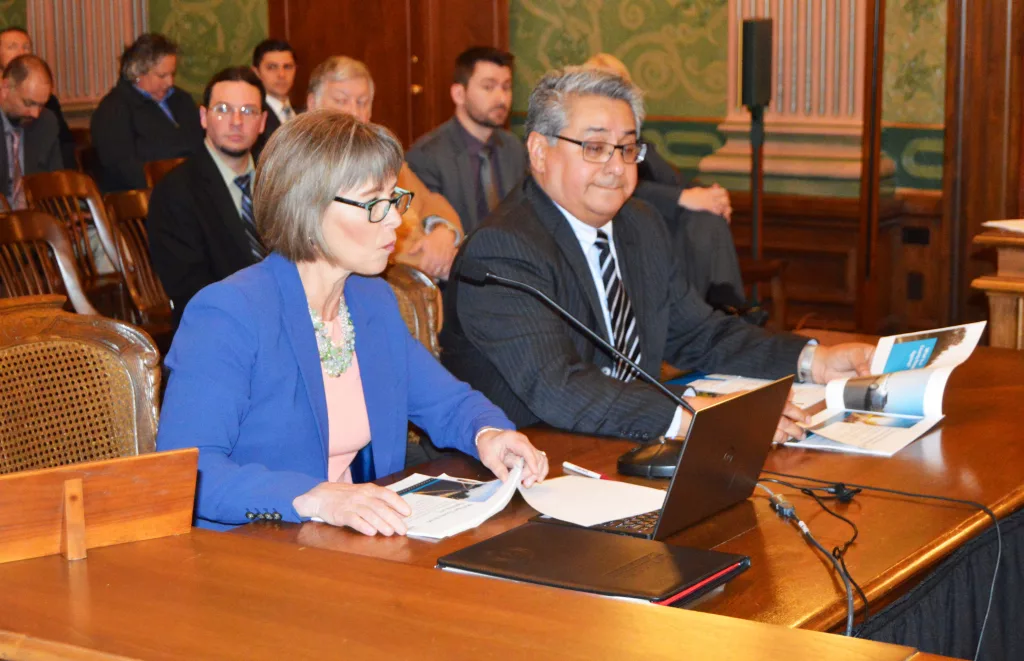It would appear that the sheer volume of bad roads in the state of Michigan is overshadowing even the progress being made in the time since the 2015 Transportation Package set the stage for the first new state road funds in 20 years. However, the County Road Association of Michigan appeared before the Michigan Senate Appropriations Subcommittee on Transportation and contends that the work is getting done, pointing to several metrics proving their point.
In a “report back” to Legislature and Michigan residents on progress with the 2015 Transportation Package, the group of road agencies demonstrated how they have invested the new revenue in roads and bridges, and township matching funds for road projects.
Denise Donohue, County Road Association (CRA) of Michigan Director, and Ed Noyola, CRA Deputy Director, today reported to that Senate Subcommittee that 88-percent of the new funding received so far by county road agencies has, in fact, been used to improve roads, bridges and rights-of-way.
Donohue told the Senate, “This survey confirms that the new dollars are going exactly where the Legislature and the public want them to go: On the road system.” She suggests, “With half of the $1.2-billion package received at the close of the state’s fiscal 2018, road agencies report improving nearly 4,100 miles of local roads annually.”
She argues, “That’s up from 2,600 miles improved annually before the 2015 road funds were injected. But when we consider there are 90,000 miles of roads under county control, it’s obvious why a second phase of road funding is needed.”
County road agencies received their first new fuel tax and vehicle registration fees from the $1.2-billion package in late February 2017, reflecting a partial year of increased funding. Fiscal 2018 brought a full year of fuel tax and vehicle registration fees, which reached approximately $600-million plus legislative supplemental budget revenue.
In its 2018 membership survey, CRA found that…
- 79-percent of the new revenue went toward improving roads and road rights-of-way…
- 9-percent toward improving bridges…
- 5-percent went toward equipment needed for road projects…
- 3-percent went to shore up unfunded liabilities as mandated by the state…
- And 1-percent each went to facility improvements and staff, with 2-percent “other.”
Donahue told the Transportation Subcommittee, “We agree with Gov. Gretchen Whitmer’s budget proposal for roads in that the total needs are in the $2.5-billion range and growing, that the problem is urgent, that a Constitutionally-protected revenue source is needed, and that any solution should be indexed to inflation,” adding, “Certain aspects of the plan require refinement, but it is encouraging that we are all focused on restoring Michigan’s total road and bridge network.”
County road agencies also report increasing their match of township dollars, whether a stipend of matching-funds-policy is followed.
According to the Transportation Asset Management Council (TAMC), in 2017 a whopping 48-percent of Michigan’s federal-aid-eligible county roads were in “poor” condition. Local roads that do not qualify for federal aid are usually in even worse shape. County road agencies oversee 90,000 miles of roads, which represents about 75-percent of the roads in Michigan – and comprise the 4th-largest local road network in the US.
Deputy Director for the County Roads Association, Ed Nyola says, “County road agencies are currently conducting our own county road investment plan,” and contends, “While this report used to be performed under Public Act 51, the state no longer evaluates the needs on all roads but simply focuses on state trunkline needs. We anticipate our report will be completed by summer, and it will be the first time in 35 years that Michigan has looked at the cost to maintain and improve the county-operated road network in a comprehensive manner.”
Another milestone in CRA’s report covered the Local Pavement Warranty Program, which has been adopted for all 83 county road agencies and 521 municipalities in Michigan. That was part of the 2015 Transportation Package, and CRA reported to the Senate Subcommittee that the project is now complete. It requires every local road agency to consider adding a warranty to any road project with more than $2-million in pavement-related items, and sets out the conditions for warranting asphalt and concrete.
Donohue points out that, “While warranties won’t make sense on every road project, the fact that every Michigan local road owner will now utilize a standardized warranty is probably a first in the US,” and says, “We look forward to reporting more good results and accomplishments next year, regarding the second phase of the new 2015 road funding.”
The 83 members of the County Road Association of Michigan represent the unified voice for a safe and efficient county transportation infrastructure system in Michigan, including appropriate stewardship of the public’s right-of-way in rural and urban Michigan.






